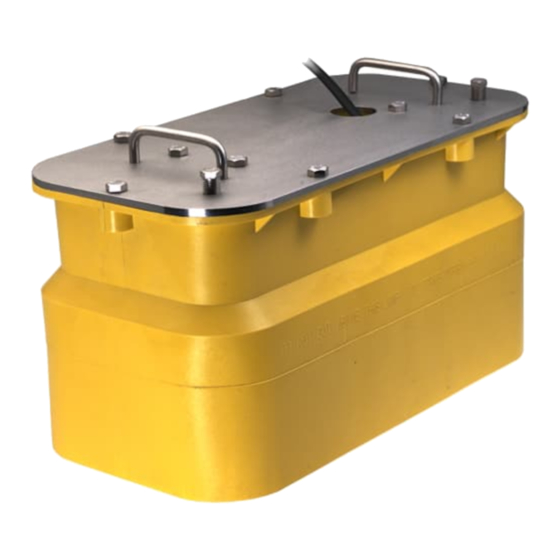Table of Contents
Advertisement
Quick Links
OWNER'S GUIDE & INSTALLATION INSTRUCTIONS
In-Hull:
2-3kW
Depth Transducer
Chirp Models: R111LH, R111LM, R599LH, R599LM
Patent http://www.airmar.com/patent.html
Follow the precautions below for optimal
product performance and to reduce the risk of
property damage, personal injury, and/or death.
WARNING: Always wear safety glasses, a dust mask,
and ear protection when installing.
CAUTION: The fiberglass hull below the transducer
must be SOLID. The transducer will not transmit
through coring material such as foam or balsa wood.
CAUTION: Do not install in the engine compartment
or other hot place. The transducer may fail if the
temperature of the liquid in the tank exceeds 60° C
(140° F).
CAUTION: Always operate the transducer in liquid.
Operating in air will allow the transducer to overheat
resulting in failure.
CAUTION: Never pull, carry, or hold the transducer by
the cable. This may sever internal connections.
CAUTION: Never use solvents. Cleaner, fuel, sealant,
paint, and other products may contain solvents that can
damage plastic parts, especially the transducer's face.
IMPORTANT: Please read the instructions
completely before proceeding with the installation.
These instructions supersede any other instructions in
your instrument manual if they differ.
Tools & Materials
Safety glasses
Dust mask
Ear protection
Torque wrench
Rope
Detergent (some installations)
Weak solvent (such as alcohol)
Disk sander (some installations)
Thin sealable plastic bag (some installations)
Cable ties (some installations)
Water-based lubricant (such as K-Y
Carpenter's level
Pencil
Saw
Scissors
Sand paper:
Bonding material (see www.airmar.com for additional brands):
Fiberglass resin:
or Marine-Tex epoxy putty (14 oz. pack)
or 3M™ Marine Adhesive/Sealant 5200
Propylene glycol (non-toxic anti-freeze/coolant)
Funnel
Grommet(s) (some installations)
®
jelly) (some installations)
80 grit
Bondo 401
West Marine #1937762
Record the information found on the cable tag for future reference.
Part No._________________Date___________Frequency________kHz
Applications
• Fiberglass hulls only
• Recommended for high-speed boats
• Accommodates a deadrise angle up to: (Figure 1)
12° on the long side of the tank
22° on the short side of the tank
• Operates at tank fill-liquid temperatures up to 60° C (140° F)
Assembling the Transducer
1. Remove the paper backing from the adhesive side of the gasket.
With the adhesive side facing the plate, align the holes and
edges of the gasket with the under side of the plate (Figure 2).
Press the gasket firmly into place.
2. Thread the cable through the cable hole in the gasket and plate.
3. Rest the plate on the transducer with the gasket side down and
align the mounting holes. Fasten the plate to the transducer.
Use four of the hex-head bolts and lock washers supplied.
Tighten using a torque wrench with a force not exceeding
85 in-lb. Do not over tighten the bolts.
4. Thread the cable under the handle as seen in the drawing above.
Figure 1. Maximum cutting angle
Copyright © 2006 Airmar Technology Corp.
cable
hole
Figure 2. Assembling the transducer
Copyright © 2006 Airmar Technology Corp.
22°
12°
"
9/16
bolt (4)
lock
washer (4)
plate
gasket
(adhesive
side up)
cable
transducer
(R299/R399 shown)
Advertisement
Table of Contents

Summary of Contents for Airmar R599LM
- Page 1 Record the information found on the cable tag for future reference. 2-3kW Part No._________________Date___________Frequency________kHz Depth Transducer Chirp Models: R111LH, R111LM, R599LH, R599LM Patent http://www.airmar.com/patent.html Follow the precautions below for optimal product performance and to reduce the risk of property damage, personal injury, and/or death.
- Page 2 Best location for the transducer 1. Take the boat to the maximum depth in which you will be Copyright © 2006 Airmar Technology Corp. operating the echosounder. If deep water is not available, find a location with at least 30m (100').
- Page 3 Figure 6. Marking the cutting guidelines Figure 7. Fitting the cork liner (22° angle shown) Copyright © 2006 Airmar Technology Corp. Copyright © 2006 - 2011 Airmar Technology Corp.
- Page 4 Replacement Transducer & Parts 4. Grasp the transducer by the handles and lower it into the tank. The information needed to order a replacement Airmar transducer There is no fore or aft to the transducer; it fits either way. is printed on the cable tag. Do not remove this tag. When ordering, 5.

















Need help?
Do you have a question about the R599LM and is the answer not in the manual?
Questions and answers